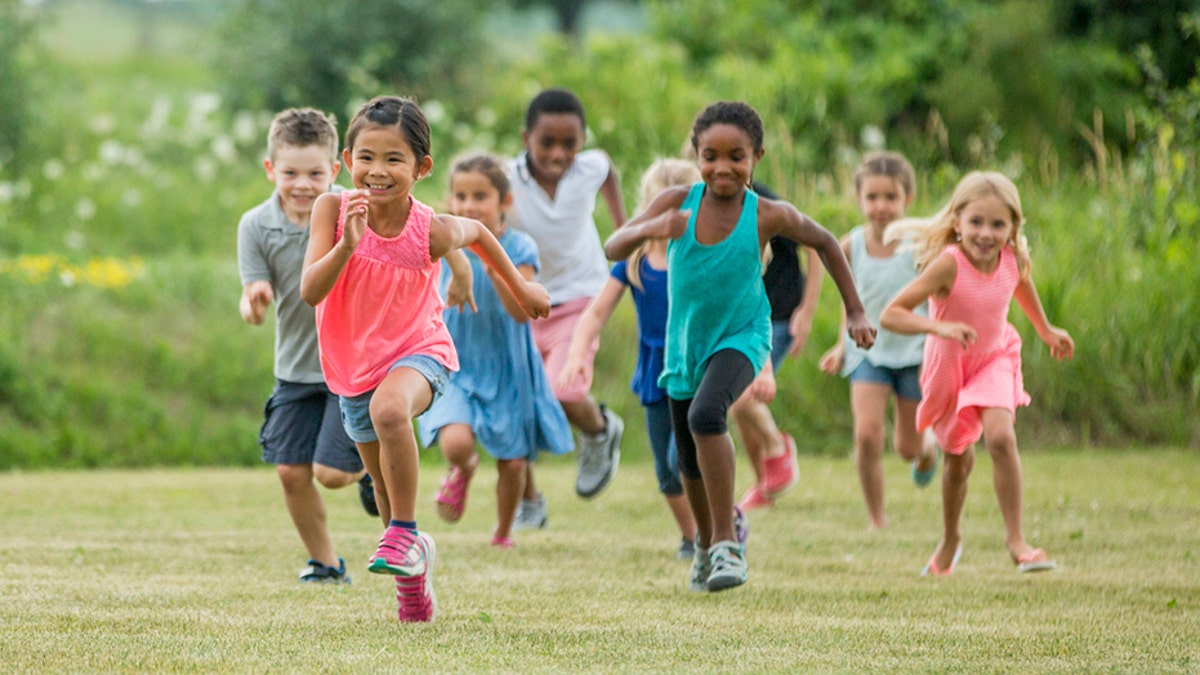
A multi-ethnic group of elementary age children are playing together outside at recess. They are chasing each other and are playing tag. (iStock)
As the weather finally, possibly, maybe looks like the warmth is here to stay, my family leaves our cave and heads to our local park. It features a sizable playground, with sprinklers and a long soccer field. We spend whole weekend days there mingling with our neighbors.
But lately I’ve noticed that the child population of the park abruptly cuts off at a certain age.
My 2-year-old will saddle up to the other 2-year-olds who enjoy pushing objects like strollers and scooters around the perimeter of the park. My 5-year-old will join a crew of other 5-year-olds in getting inexplicably dirty and turning all available sticks into weapons.
But my 8-year-old will often find no one her age and end up hanging off the monkey bars by herself.
Where are the kids?
It turns out they’re all in after-school or weekend programs. Some do coding, some learn another language or take art or music lessons.
My daughter does some of these, too, at least in part because everyone else does and it would be weird not to. But we still leave her a lot of time to do nothing much outside. It’s becoming rarer to find kids her age doing the same.
It’s not just the upper-middle class overscheduling its kids, either. City- and state-funded after-school programs are plentiful in New York City. In fact, Gotham boasts a higher percentage of kids in after-school programming than the rest of the country, with nearly 30 percent of kids participating. And that doesn’t count all of the kids doing classes and lessons outside the official after-school programs.
It’s not just for babysitting, either. After-school programs for middle schoolers were an important part of Mayor Bill de Blasio’s re-election campaign, and his launch of School’s Out New York City was an unprecedented expansion of after-school programs here.
“Learning shouldn’t stop when the school bell rings,” the mayor said, adding that the program would “keep our kids off the streets and out of trouble between the hours of 3 and 6 p.m.”
Keeping kids “off the streets” is all fine and good, but we’re keeping them from running around and being kids, too.
Unstructured play helps them negotiate friendships and use their imaginations to create a good time for themselves. The physical activity of play also helps keep kids healthy and fight obesity.
When the website Mashable posted a video of a UK school program happy with the results from having students run around 15 minutes a day, University of Tennessee Law Professor Glenn Reynolds tweeted, “We shall call it . . . ‘recess.’ ”
It’s not like we don’t know that the accidental exercise of play has a variety of benefits for kids. So why don’t we encourage it more?
Pulling on information from numerous studies, a 2013 article published by the American Academy of Pediatrics found that recess was “a necessary break” from the concentration of the classroom but also that it had “cognitive, social, emotional and physical benefits.”
This quite obviously applies to unofficial recess at the playground after school and on weekends, too.
In addition to the concern that kids will get into trouble if they aren’t meticulously scheduled in after-school and weekend programming, the other bogeyman is screen time. The idea is that any moment that isn’t filled can devolve into TV or tablet time, and to fight it families are limiting free play.
Writing in defense of the “overscheduled child” in The Washington Post last May, Andrea Orr noted that even with tennis, soccer, track, piano, band and weekly Sunday school, she still needs to limit her child’s screen time.
But what if parents simply parented their children and said “no” to too much TV and tablet time? The choice doesn’t have to be between planned and paid-for activities or drooling in front of the tube or being on “the streets.”
Take your 8-, 10-, 12-year-olds to the park. Let them climb stuff and make new friends on the fly. Think of it as an enrichment class for your kids — Monkey Bars 101. It’s just as important as their other classes but free and useful.
Let your kids be kids. The warm weather won’t last forever, and neither will their childhood. Enjoy both while they last.








































